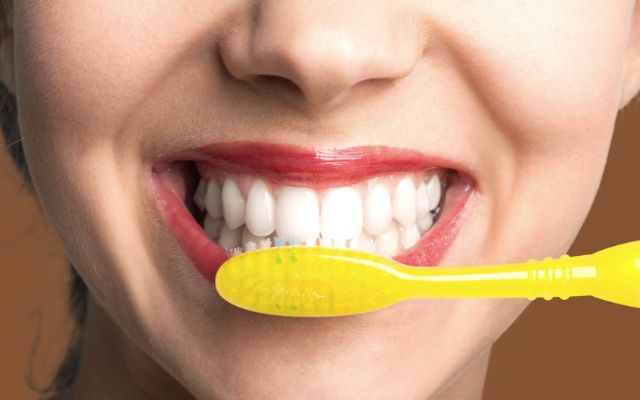Sensitive teeth may experience sensitivity when eating sweet, sour, hot, cold, or changing temperatures. Problems with tooth sensitivity may be brought on by a wide variety of factors.
Let’s ask dentist Spring Orchid about sensitive tooth symptoms and how to treat them!
What Are Sensitive Teeth?
The American Dental Association defines tooth sensitivity as an unexpected feeling generated by a dentin irritant, such as heat or cold.
Teeth have 3 main components:
- Enamel
- Dentin
- Pulp
Dentin is usually protected by enamel, however, enamel wears away for several causes. Dentin hypersensitivity occurs when the neural tube directly touches hot and cold liquids and meals, irritating the nerves.
Sensitivity Front & Back Teeth

Instinctively delicate incisors are a telltale symptom of a sensitive neck. Root canal wear, also known as a deep, concave V-shaped groove, often appears on the chewing surfaces of premolars (teeth 4 and 5), molars (teeth 6 and 7), and incisors (teeth 1 and 2). Most people who suffer from this condition report extreme teeth sensitivity to temperature changes and sugary or acidic meals.
Tooth wear may worsen and produce pulpitis, inflammation around the tooth’s apex, making brushing and mouth washing painful. Incisors, canines, and premolars wear necks. Cervical wear begins as a little groove at the tooth root that the patient does not perceive. The groove develops slowly, producing discomfort, sensitivity, and transverse fractures in extreme instances.
Reasons For Sensitive Teeth
Tooth sensitivity may be brought on by poor oral hygiene or dental issues. Dentin sensitivity occurs when the enamel is eroded due to diet, activity, and other factors. This condition requires direct nerve irritation by exogenous substances on the neural tube.
Dental Disease |
Bad Habit |
When gums recede, the dentin layer beneath the roots of the teeth becomes exposed to the environment, where acids from saliva and metabolic foods peel away the enamel to reveal the dentin. Sensitivity in the teeth is a result of the irritation of the inner nerve system brought on by tooth thinning. |
When you brush too hard, use an abrasive toothpaste, brush wrongly, or brush more than three times a day, you’re not helping your teeth at all and may even be speeding up the erosion of their protective enamel, which may lead to cavities. |
Exposure of the sensitive dentin layer occurs in cases of enamel wear, open neckwear, and chipped teeth. Temperature variations and tooth-sensitive foods may irritate these tubes when dentin is exposed. |
Tooth sensitivity is caused by the exposure of dentin, which occurs as a result of the wear and decay that occurs on the tooth surface as a result of a diet high in acidic foods such as numerous acidic meals, citrus fruits, pickles, or carbonated soft drinks, soda. |
Teeth may chip or crack from excessive force, such as when biting on ice or hard candies, or from trauma. Cracked teeth may cause pain while eating because they expose exposed nerve endings. Bacteria may potentially invade the fissure and create toothache. |
Damage to the gums and subsequent exposure of the dentin layer may result from forceful or too-hard tooth brushing. Since then, teeth are sensitive to hot and cold foods, as well as to cleaning, and flossing. |
Temporary toothache might result after braces, fillings, teeth whitening, or other dental operations. The quality will cause tooth sensitivity if the method is not done correctly. You’ll get toothaches from sour and sugary meals during this period. Thus, teeth must be limited to normalize. |
Tooth enamel may be the body’s strongest tissue, yet it may nevertheless be worn away over time by seemingly innocuous behaviors like teeth grinding. To prevent dental sensitivity, restrict these behaviors. |
How To Stop Sensitive Teeth Pain Immediately?

A glass of warm water may be used as instant relief from the tingling feeling that might occur after eating sour, hot, or cold food. Although it may help in the short term, there may be situations in which this is not enough to alleviate the pain.
Dentist Spring Orchid advises paying more attention to oral health issues if you want to permanently resolve sore teeth.
Home Remedies For Sensitive Teeth Pain
How to help sensitive teeth pain? When you have sensitive teeth, you may experience discomfort, such as a dull ache or a sharp pain, but you may not always be able to immediately see the dentist.
The best way to cure sensitive teeth is to see the dentist, but in the meantime, Spring Orchid will walk you through several at-home treatments and OTC drugs.
Salty Water
Salt’s major constituent, sodium chloride, inhibits microbial development in many meals. Because salt absorbs water molecules, bacteria cannot reproduce without water. Rinsing with salt water is helpful for oral health. Salt water’s alkalizing impact elevates the mouth’s pH, preventing bacteria development.
Daily salt water gargling may help remove bad breath. Because salt water helps eliminate mouth germs that cause foul odor and gingivitis. Additionally, salt water eliminates food plaque, and reduces bacteria growth, and tooth decay.
Spring Orchid’s salt water gargling guidelines:
- First, drink a little salt water. Avoid drinking too much water since it will be hard to rinse.
- Next, gargle for at least 35 seconds. Make sure the mouth rinse can reach hard-to-reach regions, particularly between the teeth.
- Spit it out, then drink again. Try rinsing for at least 60 seconds this time to give the salt water more time to act on your mouth.
- Finally, rinse your mouth with clean water to eliminate any salt.
Don’t rinse too much with salt water—the sodium might harm your enamel. Therefore, just gargle salt water 3–4 times a week.
Toothpaste for Sensitive Teeth
The most frequent method for treating tooth sensitivity is to use toothpaste. It is really useful in mild cases. After one brushing, the sensitivity will quickly cease.
There are gels available as well. Consult your dentist before to use.
Guava Leaves
Antibacterial and anti-inflammatory astringents present in guava leaves. Folklore treats pain with guava leaves. You may boost sensitivity by chewing guava leaves. Alternatively, you can:
- To prevent dirt, thoroughly wash 10-20 guava leaves from the veins.
- Then, fill the pot up with water until it reaches the level of the guava leaves.
- Next, boil the water, let it simmer for 5-7 minutes to release the leaves’ essence, then switch off the machine.
- Finally, drain the water once it cools to eliminate the residue.
The guava leaf juice made in the previous section may be poured into the cup. Add 1 teaspoon of salt and gargle 3-4 times a day for best results.
Clove Oil
Cloves have been used for centuries as a natural remedy for a variety of bacterial and fungal infections. It’s not only sensitive teeth that clove oil helps with; it treats a wide variety of oral conditions. Follow these instructions:
- Use a cotton swab, cotton ball, or clean paper towel to apply 2-3 drops of clove oil.
- Put some gauze, cotton, or tissue on the painful spot and keep it there until the pain goes away.
NOTE: Dilute clove oil with olive oil if it’s too strong.
Over-the-counter Therapies
A toothache may often be alleviated with over-the-counter pain remedies like ibuprofen or acetaminophen, however, you should always speak with your doctor before taking any new drug. Additionally, pain medications and sensitive tooth toothpaste might assist alleviate discomfort.
Use sensitive-teeth toothpaste and brush carefully to protect the teeth’s nerve endings. Soft-bristled toothbrushes are preferable because they cause less trauma to the sensitive dentin and pulp tissue.
Natural Endorphins
The feel-good chemicals known as endorphins are released during physical activity and help reduce feelings of discomfort. A regular exercise routine, such as a workout or a run, may help alleviate dental pain.
If you can’t handle more strenuous exercises, a brisk stroll is a great alternative.
Protect Your Teeth From Sensitivity

Practicing good dental hygiene on a daily basis is crucial in preventing tooth sensitivity. To safeguard your teeth, try:
- With sensitive tooth toothpaste, brush your teeth before a meal, twice a day in the morning, and at night before bed.
- When brushing your teeth, always use a soft-bristled toothbrush and a circular motion rather than a horizontal one.
- Change the toothbrush every 2-3 months, or sooner if it’s linty.
- Limit tooth-damaging foods including sugar, fizzy beverages, and acids.
- The use of a mouthguard is recommended if you have the tendency of grinding your teeth while sleeping; discuss this with your dentist.
- Dental check-ups.
- To strengthen teeth and avoid sensitivity, use fluorine-containing toothpaste. Fluorine improves mineral remineralization, preventing tooth decay before cavities appear. Some toothpaste chemicals whiten and clean teeth, giving people confidence.
Sensitive Teeth Treatment
The measures listed above are typically employed for mild cases of sensitivity. You should see a dentist if you wish to treat the underlying cause and avoid long-term consequences. Your dentist will thoroughly inspect your teeth and offer the best treatment strategy for you. Here are some of the most popular approaches.
Before fillings, the dentist will clean the teeth, remove decay, and treat any diseases that may exist. After that, the filling material is placed to the tooth surface. Typically, this material is a composite. It protects teeth by replacing enamel on the tooth’s surface.
This is an option for teeth that are severely worn or have significant cavities. The dentist will grind the enamel to make it even. The tooth is then protected on the inside with a porcelain crown. This approach has a rather good aesthetic value.
Other procedures include remineralization, endodontic treatment, anti-sensitizing gel, and so on.
If the patient has a dental problem, it must be addressed first. You should see your dentist for a checkup to learn more about your problem.
Summary
In conclusion, sensitive teeth occur when specific meals or weather induce dental sensitivity and discomfort. Sensitive teeth may be brought on by a variety of factors, including gum disease, consuming an excessive amount of acidic and cold foods, dental decay, tooth damage, and so on.
Patients with sensitive teeth often experience severe, intense pain, therefore it’s important to see the dentist as soon as possible upon discovering any abnormalities in the teeth and gums.
Spring Orchid Dental Clinic specializes in comprehensive, aesthetically pleasing pathological tooth therapy (teeth, bone, pulp,…). We offer restorative dentistry, maxillofacial trauma, general dentistry, cosmetic dentistry, and endodontics to meet patient requirements.
Let’s book an appointment with our Bassendean dentists.
FAQs
Should You Consult A Dentist If You Develop A Toothache After Eating Sour Food?
Sour food’s acid affects enamel and dentin, making it natural to consume it. It’s usually ignored till it goes gone. However, if this condition persists, it will drastically impact your life. If you’re sensitive to sour and other foods, you may have dental problems.
In this instance, you must see your dentist immediately to prevent germs from damaging dentin and pulp. Regular dental visits for toothaches are important for your health. Your dentist will diagnose, treat, and recommend oral hygiene.
Dentist Treatment For Sensitive Teeth?
Having sensitive teeth might be a result of wearing a choker or other neckwear. Improper biting or brushing causes tooth root wear. You should go to a doctor specializing in such matters in order to get the neck welded.
Treatment for periodontitis often involves tartar removal and antibiotics applied to the affected areas. Medication prescribed by your doctor is available for home use.
Spring Orchid Dental is here to help if you have any ongoing concerns regarding tooth sensitivity after your first consultation.
How long do sensitive teeth pain last?
The duration of sensitive teeth pain can vary depending on the underlying cause. In some cases, it may only last for a few hours or days, while in others it can be ongoing. It’s best to consult with a dentist to determine the cause of the sensitivity and appropriate treatment.
When does teeth sensitivity start in pregnancy?
Teeth sensitivity can occur at any time during pregnancy due to hormonal changes and increased blood flow, but it is most common in the second trimester.
Why are my front teeth sensitive all of a sudden?
Sudden tooth sensitivity can be caused by several factors, including dental problems like tooth decay or gum disease, teeth grinding, cracked or chipped teeth, or exposure of the tooth roots due to receding gums. It’s important to consult with a dentist to determine the cause and receive appropriate treatment.
Contact Our Team
Spring Orchid Dental Clinic provides dental treatments in Bassendean, Perth, Western Australia.
Contact the Spring Orchid Dental clinic’s hotline at 08 6155 8999.





